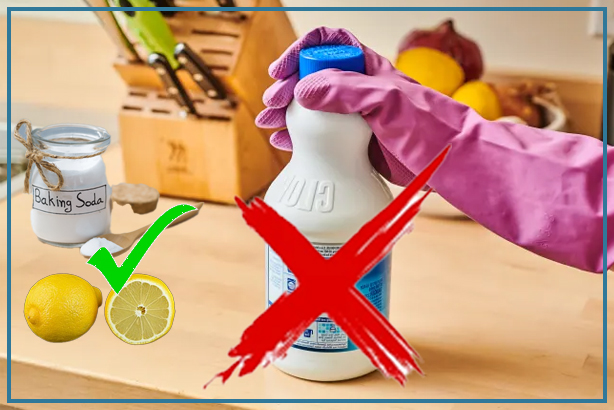
Bleach has long been a go-to cleaning agent for households, thanks to its powerful disinfecting and whitening properties. However, its harsh chemical nature can pose risks to both health and the environment. If you’re looking for safer, eco-friendly, and equally effective alternatives to bleach, this guide is for you. In this comprehensive article, we’ll explore various natural and non-toxic cleaning solutions that can replace bleach, ensuring your home stays clean and healthy.
Why Consider Alternatives to Bleach?
· Health Concerns
Bleach can cause respiratory issues, skin irritation, and eye damage. It releases harmful fumes that can be particularly dangerous for children, pets, and people with asthma or allergies.
· Environmental Impact
Bleach contributes to water pollution and can harm aquatic life. Its production and disposal also add to the overall environmental footprint.
· Safe and Natural Alternatives
Natural alternatives to bleach are not only safer for your health but also kinder to the environment. These alternatives can effectively disinfect, whiten, and clean various surfaces without the associated risks of bleach.
Top Natural Alternatives to Bleach
1. White Vinegar
White vinegar is a versatile and powerful natural cleaner. Its acetic acid content makes it effective at killing bacteria, mold, and mildew. It’s safe to use on most surfaces and can be mixed with water for a simple cleaning solution.
Usage: Mix equal parts of white vinegar and water in a spray bottle. Use it to clean countertops, sinks, and bathroom surfaces.
2. Baking Soda
Baking soda is a gentle abrasive that can help with scrubbing and deodorizing. It’s great for cleaning kitchen appliances, sinks, and bathtubs.
Usage: Sprinkle baking soda on the surface and scrub with a damp cloth or sponge. For tougher stains, make a paste with water and baking soda.
3. Hydrogen Peroxide
Hydrogen peroxide is a natural disinfectant that’s effective at killing bacteria and viruses. It’s also a great whitening agent for laundry.
Usage: Use a 3% hydrogen peroxide solution to disinfect surfaces. For laundry, add a cup of hydrogen peroxide to the wash cycle.
4. Lemon Juice
Lemon juice has natural antibacterial and antiseptic properties. Its acidic nature helps cut through grease and grime, and it leaves a fresh scent.
Usage: Mix lemon juice with water to clean and disinfect surfaces. It’s also effective for removing stains and polishing metal.
5. Castile Soap
Castile soap is a plant-based soap that’s free from synthetic detergents and animal fats. It’s gentle yet effective for cleaning a variety of surfaces.
Usage: Dilute castile soap with water and use it to clean floors, countertops, and even as a hand soap.
Specialized Natural Cleaning Solutions
1. Tea Tree Oil
Tea tree oil has potent antimicrobial properties, making it an excellent addition to your natural cleaning arsenal.
Usage: Add a few drops of tea tree oil to water or vinegar solutions to enhance their disinfecting power.
2. Essential Oil Blends
Essential oils like lavender, eucalyptus, and peppermint not only add a pleasant scent but also have antibacterial properties.
Usage: Combine a few drops of essential oils with water or vinegar solutions for enhanced cleaning and a fresh aroma.
3. Washing Soda
Washing soda is a more alkaline form of baking soda. It’s highly effective for heavy-duty cleaning tasks and removing tough stains.
Usage: Use washing soda for laundry, cleaning grout, and tackling greasy stains. Always wear gloves when handling washing soda as it can be harsh on the skin.
Natural Cleaning Recipes
· All-Purpose Cleaner
Create an all-purpose cleaner that’s safe for most surfaces.
Ingredients:
- 1 cup white vinegar
- 1 cup water
- 10-15 drops of essential oil (e.g., lemon or lavender)
Instructions: Mix all ingredients in a spray bottle. Shake well before each use. Spray on surfaces and wipe clean with a cloth.
· Disinfecting Spray
This disinfecting spray is perfect for kitchen and bathroom surfaces.
Ingredients:
- 1 cup water
- 1 cup hydrogen peroxide (3% solution)
- 10 drops tea tree oil
Instructions: Combine all ingredients in a spray bottle. Spray on surfaces and let it sit for 10 minutes before wiping clean.
· Stain Remover
A natural stain remover that works on various types of fabric.
Ingredients:
- 1 cup water
- 1/2 cup baking soda
- 1/2 cup hydrogen peroxide
Instructions: Mix all ingredients to form a paste. Apply the paste to the stain and let it sit for 30 minutes before washing.
Benefits of Using Natural Alternatives
1. Health Benefits
Using natural cleaning solutions reduces exposure to harmful chemicals, protecting your respiratory health and skin. They are safer for children and pets.
2. Environmental Benefits
Natural cleaners are biodegradable and do not contribute to water pollution. They have a lower environmental impact compared to synthetic chemicals.
3. Cost-Effectiveness
Many natural cleaning ingredients are inexpensive and can be found in most households, making them a budget-friendly option.
Conclusion: Embracing Natural Cleaning
Switching to natural cleaning alternatives is a smart and responsible choice for maintaining a clean, healthy, and eco-friendly home. By understanding the benefits and methods of using these alternatives, you can effectively replace bleach with safer options. Not only will you protect your health and the environment, but you’ll also enjoy the satisfaction of a clean home without the harsh chemicals.
Start using natural cleaners today and experience the benefits for yourself. Share your favorite natural cleaning recipes and tips in the comments below!
By following this guide and incorporating these natural alternatives into your cleaning routine, you can achieve a spotless home without relying on bleach. Enjoy a safer, healthier, and more environmentally friendly approach to cleaning!
Note: Always test a small, inconspicuous area before using any cleaning solution on a larger surface to ensure it does not cause damage.